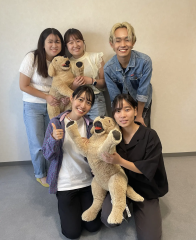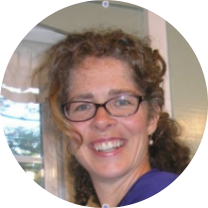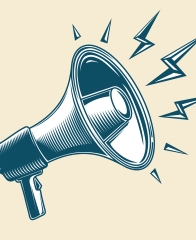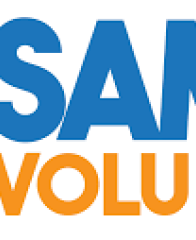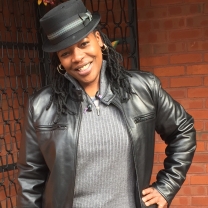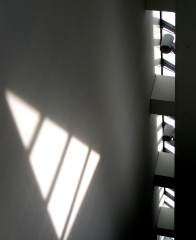 / Community Building at Refugym, Malakasa
Subscribe
/ Community Building at Refugym, Malakasa
Subscribe
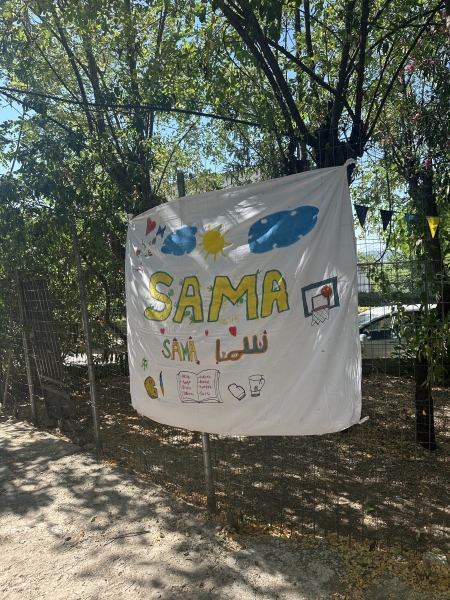
Initially founded in 2017, Refugym has since transitioned from being an NGO that provides activities and services (specifically sports) within refugee camps, to one that offers such activities and more within a physical space outside of the camps. After years of having access to refugee communities within camps, my supervisor, in 2023, Brittany Pummell and other volunteers began to face increasing restrictions from the Greek government. Ultimately, today in 2025, no outsiders are permitted to enter the 27 heavily-guarded, barbed-wire refugee camps across Greece. That leads us to the community center called Sama which now exists as a result of the transformation of Refugym into a physical space (an old taverna) several minutes away from the two refugee camps in Malakasa, Greece.
The word “Sama” means “sky” in Arabic, and in September 2024, it was voted on by individuals within the refugee community to be the official name of our newly-opened safe space. Located just next to the Sfendali train station and a few minutes walk from both Malakasa A and Malakasa B camps, Sama exists as a safe space away from the oppressive nature of the camps. Once an old taverna, Sama now contains a basic weight room inside, bathrooms, a private room for doctor visits, a patio for teaching classes, a volleyball net, and an overall beautiful outdoor space. Stepping into the vicinity of Sama each day and beginning to prepare for a full day of activities, I always felt my body ease up and relax as a gentle breeze flowed through the leaves of our many trees and I heard the cicadas chirping away. It is difficult to describe exactly how the space felt, yet I feel that it is important to emphasize how the serene physical landscape of Sama contributes to its overall purpose.
My specific responsibilities at Sama consisted of managing our space (set-up, community rules, etc), teaching English classes (all levels), and engaging with individuals (via playing volleyball, sitting together, basic conversation, etc). Given the transient nature of our work, the organizational structure in terms of daily activities varies at times depending on who shows up and what their learning goals are. For example, because Malakasa contains an identification camp, many refugees are identified within 30 days of arrival and sent to various other camps throughout Greece. The constant flux of refugees into and out of Malakasa makes it difficult to teach English, for example, in a formal, linear way. Sometimes we would have the same group of students attend our classes for a week or two, and then they would notify us that they were being transferred to Ritsona or Katisikas – camps that are much further away, making it impossible for them to come to Sama on a regular basis. The reality of this transience means that we at Sama had to constantly adapt to the language levels and needs of those who came to our classes.
When I first began working at Sama my main supervisor ended up going on a week-long trip which meant that it was only me and another volunteer essentially running the center. I was told to start teaching English classes right away to keep our schedule going, which was quite anxiety-producing for me. I had never really taught English before, let alone in a different country and with individuals who often had little to no English knowledge. Accepting this challenge, I began by teaching very basic songs to my students. We would go line-by-line listening to the song on a speaker and filling in the blank lyrics on a whiteboard. “Let It Be” by The Beatles and “Count on Me” by Bruno Mars quickly rose to prominence within our Sama community. After gaining some confidence in teaching these songs, I began teaching basic poetry to my intermediate-level students, which, don't get me wrong, was also quite difficult at times. I would often rely on a student or two who could understand my English and translate what I was saying to everyone else in Arabic. I began to talk slower so my words could be understood easier and I simplified some of my vocabulary to make my teaching more accessible. I also began to learn some basic Arabic phrases which I would use during my lessons – something small, but something that meant a lot to my students.
In addition to the small changes I made on my own while teaching I also had the opportunity to learn from others in the same field of work. In early July I had the opportunity to attend a free training program called Erasmus+ Program: Innovation Learning Environments for Refugee Adult Language Needs. Together with my supervisor, I spent a total of 32 hours that week learning and practicing different strategies to improve teaching adult refugees in a non-formal setting. This opportunity provided me with important knowledge that most definitely helped me improve the structure and activities of the English classes I taught at Sama. Moreover, during this week-long program I met numerous other people who also volunteered for similar refugee-related programs in Athens. Meeting and forming relationships with others in this way was another powerful, community-building experience.
Ultimately, my time volunteering at Sama was absolutely incredible and extremely insightful. I experienced first-hand how people can engage with one another across differences – how, despite our various circumstances of where we come from or the languages we speak, kindness and compassion are universal. A simple handshake communicates trust and respect and a smile can go so far. Being able to work with refugees in a community-centered approach was also very valuable. The connections I made and beautiful moments of community that I shared with others helped me realize that I wish to pursue a career in public interest law where I can use legal tools for the benefit of others. Recognizing my own privilege, I believe that it is crucial to support and empower individuals who now face immense challenges due to events or circumstances beyond their control. My summer in Greece pushed me out of my comfort zone in many ways, yet the many challenging moments I encountered helped build up my confidence to keep trying. I am so grateful to the Albright Institute and everyone who helped me make it to Greece this summer as my internship undoubtedly pushed me toward a certain legal career path.
